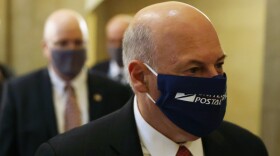
Dina Temple-Raston
Dina Temple-Raston is a correspondent on NPR's Investigations team focusing on breaking news stories and national security, technology and social justice.
Previously, Temple-Raston worked in NPR's programming department to create and host I'll Be Seeing You, a four-part series of radio specials for the network that focused on the technologies that watch us. Before that, she served as NPR's counter-terrorism correspondent for more than a decade, reporting from all over the world to cover deadly terror attacks, the evolution of ISIS and radicalization. While on leave from NPR in 2018, she independently executive produced and hosted a non-NPR podcast called What Were You Thinking, which looked at what the latest neuroscience can reveal about the adolescent decision-making process.
In 2014, she completed a Nieman Fellowship at Harvard University where, as the first Murrey Marder Nieman Fellow in Watchdog Journalism, she studied the intersection of Big Data and intelligence.
Prior to joining NPR in 2007, Temple-Raston was a longtime foreign correspondent for Bloomberg News in China and served as Bloomberg's White House correspondent during the Clinton Administration. She has written four books, including The Jihad Next Door: Rough Justice in the Age of Terror, about the Lackawanna Six terrorism case, and A Death in Texas: A Story About Race, Murder and a Small Town's Struggle for Redemption, about the racially-motivated murder of James Byrd, Jr. in Jasper, Texas, which won the Barnes and Noble Discover Great New Writers prize. She is a regular reviewer of national security books for the Washington Post Book World, and also contributes to The New Yorker, The Atlantic, New York Magazine, Radiolab, the TLS and the Columbia Journalism Review, among others.
She is a graduate of Northwestern University and Columbia University's Graduate School of Journalism, and she has an Honorary Doctorate of Humane Letters from Manhattanville College.
Temple-Raston was born in Belgium and her first language is French. She also speaks Mandarin and a smattering of Arabic.
-
Deepfake videos haven't been a problem yet in the 2020 presidential race. It's not because they aren't a threat, but because simpler deceptive tactics are still effective at spreading misinformation.
-
The Government Accountability Office, a nonpartisan government watchdog, will review the federal government's use of nonlethal weapons and the tactics it wielded against protesters this summer.
-
In June, federal police cleared peaceful protesters from a park by the White House. Lawyers now say U.S. Park Police violated a settlement that set out rules for engaging mass demonstrations in D.C.
-
Postmaster General Louis DeJoy, a longtime Republican donor, controls the U.S. Postal Service at a time when mail-in voting is central to the presidential election.
-
The administration awarded a contract for a COVID-19 database to TeleTracking Technologies using a process reserved for innovative research. Its CEO had links to the New York real estate world.
-
Seven multi-million-dollar contracts are at the center of a House subcommittee probe. Investigators say the companies lacked experience and some had political connections to the Trump administration.
-
Two lawyers could face life in prison for allegedly firebombing an empty police car during a protest in New York. Prosecutors call it a calculated crime. Supporters say they're being singled out.
-
In 2016, the U.S. launched a classified military cyberattack against ISIS to bring down its media operation. NPR interviewed nearly a dozen people who lived it.
-
Conservationists are deploying audio recorders, neural networks and predictive analytics in a bid to save elephants.
-
Adrian Lamo was a hero in the hacker community for years. Everything changed when he began exchanging messages with U.S. Army intelligence analyst Chelsea Manning.









